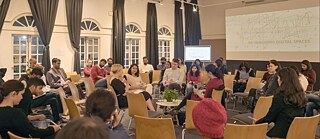A conversation with four digital experts
Digital Dilemmas: Democracy and Public Discourse Online

The impact of digital media on societies is a subject of continuous debate. While some emphasize the corrosive influence of disinformation and hate culture on social cohesion, some highlight the potential of digital platforms for enabling emancipatory civil movements, like #metoo. How do ownership structures, content moderation and internet shutdowns affect digital spaces? How can we design the online spaces that we wish for? Four experts and activists from India and Germany delve into these queries, scrutinizing the dilemmas surrounding digital spaces.
By Akshit Chawla
Controlling the use of physical technology infrastructures
The physical infrastructure layer of technology includes tangible components that facilitate the functioning of a technology. It includes things like servers, data centers, storage devices, and telecom towers.Elisa Lindinger: Looking at the physical infrastructure layer of technology is really important. This layer could embody either autonomy and self-governance or surveillance and control. Take the example of a community-led approach in Oaxaca, Mexico, where communities own their GSM network. This gives them decision-making powers on things like which regions need more connectivity and which don't. Without this initiative, several regions in Oaxaca would have remained vastly disconnected.
Aparajita Bharti: Having a community-led approach also poses challenges. In a country like India, due to inequalities in things like caste and gender, only a few (dominant) people could end up becoming the voice of a community. This was one of the reasons why civil societies in India pushed back on a report put out by the Indian government which said that non-personal data about communities should belong to them, and therefore they should be able to manage it.
Content moderation
Currently, a few big private companies (like Facebook, X), along with government entities exercise significant decision-making power on what content is allowed to be published online. They wield this power due to the authority they possess over the physical and digital infrastructures that facilitate digital platforms. How does this affect content moderation online? What is the best way to go about content moderation?Vrinda Bhandari: One concern with content moderation is that of shadow bans. There have been reports of people saying that they are being shadow-banned because of posting – such as the ongoing debate on pro-Palestinian content. This is such an opaque system. The question is what one does if one is being shadow-banned and whom does one speak to? In addition, a lot of Twitter accounts keep getting blocked in India and the users don’t even get to know the reason behind it. The only thing that people often get to know is that their account has been withheld owing to a legal request by the government of India.
Erik Tuchtfeld: It's not the government’s task to define nuances of what content should be allowed and what information is true or false when we talk about disinformation. At the same time, it should also not be private companies. It shouldn't be one entity or person in Silicon Valley deciding if a piece of content should stay online or not. We should look in the direction of having a BBC-like model, which is publicly funded but is still independent of the government. Germany has two very big (broadcasting channels) – both are public infrastructure and are funded through the license fees paid by households – but are still independent of the government and controlled by councils which are somewhat representative of society.
Internet shutdowns in India
According to an Access Now report, India implemented 84 internet shutdowns in 2022, the highest of any country in the world. This has led to several practical challenges for residents, like restrictions on communication, education, travel, banking, and more. Even the procedures for imposing internet shutdowns have been criticized by free speech activists and civil society groups.Vrinda Bhandari: The threshold to have an internet shutdown in India is fairly low. It can be done for simple things like maintaining ‘public order’, which is a term that is hard to define. Internet shutdowns restrict online speech, a phenomenon that was witnessed in Manipur, a state in north-east India. Internet shutdown in the city led to the suppression of instances where women were paraded naked on the streets during an episode of ethnic violence. Once the internet services resumed, these videos were freely circulated. And whether we like it or not – today, the pressure on governments is only when something becomes a public sensation or a public scandal. Incidents in some parts of the country may go undocumented due to shutdowns, necessitating continuous internet access.
Reimagining a better tomorrow
While the internet has made information and publishing much more accessible to people in general, it has also become a hotspot for hate speech and misinformation. Many question if the promise of a democratic and decentralized internet seems to be fading. Hence, now it becomes more important than ever to ask - what an ideal digital public space looks like and how to go about achieving it.Elisa Lindinger: Having a more decentralized internet where communities of a few thousand people could be interconnected to each other, and to a global network, would characterize an ideal digital public space.
Aparajita Bharti: It is important to design better incentives within the technology ecosystem for more transparency. One way to do this could be to get platforms to do their risk assessment and then put this data out for public scrutiny.
Eric Tuchtfeld: Platforms should have transparent algorithms, and content moderation should happen in a manner that is not entirely dependent on the platforms or the government.
Vrinda Bhandari: Consumers should demand better policies from technology platforms. One can’t overstate the importance of transparency and having simpler procedures to seek recourse for things like content restriction.
The Experts

Elisa Lindinger is co-director and co-founder of SUPERRR Lab, a Berlin-based feminist organization dedicated to designing diverse and equitable futures in tech and beyond. Trained as an archaeologist, Elisa has worked in the fields of culture and computer science for more than a decade, both inside and outside of academia. Her work focuses on the social impact of new technologies and their regulations.

Erik Tuchtfeld is co-chair of D64 - Center for Digital Progress, one of Germany's largest civil society organisations for digital policy. With its thirteen working groups, D64 addresses all aspects of digital transformation, with a current focus on digital public spaces and possible responses to the rise of right-wing populism in Europe and beyond. A lawyer by training, Erik's main areas of interest are the regulation of social platforms, freedom of expression and the right to privacy in the digital sphere.

Aparajita Bharti is a Founding Partner of The Quantum Hub and co-founder of Young Leaders for Active Citizenship (YLAC) which works with young people to increase their engagement with democratic processes. Before starting these two organisations, Aparajita was Manager, Corporate Affairs and Communications at Snapdeal where she was responsible for managing media messaging while engaging with policy and legislative issues that affect the digital commerce sector. Aparajita holds an MPP degree from Oxford University and her work cuts across the domains of gender, tech policy and integrity of India’s democratic institutions.

Vrinda, a Rhodes Scholar with dual Masters in Law and Public Policy from the University of Oxford and an undergraduate law degree from NLS, Bangalore, is a litigating lawyer in Delhi. She specializes in digital rights, technology, and privacy, contributing significantly to cases like the Aadhaar challenge, restoration of internet in Jammu & Kashmir, and constitutional challenges to sedition.